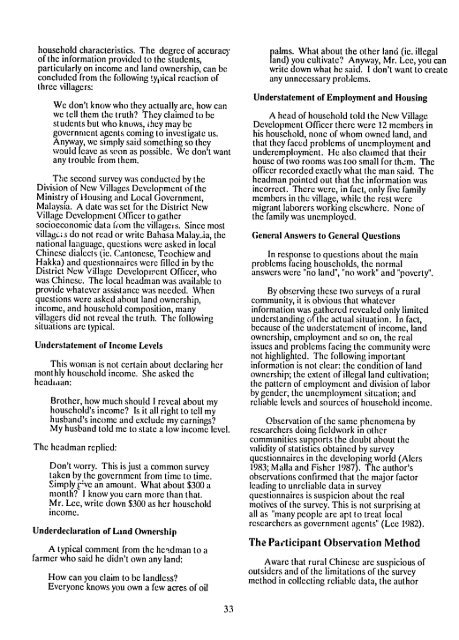multipurpose tree species research for small farms: strategies ... - part
multipurpose tree species research for small farms: strategies ... - part
multipurpose tree species research for small farms: strategies ... - part
You also want an ePaper? Increase the reach of your titles
YUMPU automatically turns print PDFs into web optimized ePapers that Google loves.
household characteristics. The degree of accuracy<br />
of the in<strong>for</strong>mation provided to the students,<br />
<strong>part</strong>icularly on income and land ownership, can be<br />
concluded from the following typical reaction of<br />
three villagers:<br />
We don't know who they actually are, how can<br />
we tell them the truth? They claimed to be<br />
students but who knows, ihey may be<br />
government agents coming to investigate us.<br />
Anyway, we simply said something so they<br />
would leave as soon as possible. We don't want<br />
any trouble from them.<br />
The second survey was conducted by the<br />
Division of New Villages Development of the<br />
Ministry of -lousing and Local Government,<br />
Malaysia. A date was set <strong>for</strong> the District New<br />
Village Development Officer to gather<br />
socioeconomic data fi'om the villageis. Since most<br />
villagc;s do not read or write Bahasa Malay.,ia, the<br />
national language, questions were asked in local<br />
Chinese dialccts (ie. Cdntonese, Teochiew and<br />
Hakka) and cuestionnaires were filled in by the<br />
District New village Development Officer, who<br />
was Chinese. The local headman was available to<br />
provide whatever assistance was needed. When<br />
questions were asked about land ownership,<br />
income, and household composition, many<br />
villagers did not reveal the truth. The following<br />
situations are typical.<br />
Understatement of Income Levels<br />
This woman is not certain about declaring her<br />
monthly household income. She asked the<br />
headman:<br />
Brother, how much should I reveal about my<br />
household's income? Is it all right to tell my<br />
husband's income and exclude my earnings?<br />
My husband told me to state a low income level,<br />
The headman replied:<br />
Don't worry. This is just a common survey<br />
taken by the government from time to time.<br />
Simply E,:ve an amount. What about $300 a<br />
month? I know you earn more than that.<br />
Mr. Lee, write down $300 as her household<br />
income.<br />
Underdeclaration of Land Ownership<br />
A typical comment from the hedman to a<br />
farmer who said he didn't own any land:<br />
How can you claim to be landless?<br />
Everyone knows you own a few acres of oil<br />
33<br />
palms. What about the other land (ie. illegal<br />
land) you cultivate? Anyway, Mr. Lee, you can<br />
write down what he said. I don't want to create<br />
any unnecessary problems.<br />
Understatement of Employment and Housing<br />
A head of household told the New Village<br />
Development Officer there were 12 members in<br />
his household, none of whom owned land, and<br />
that they faced problems of unemployment and<br />
underemployment. He also claimed that their<br />
house of two rooms was too <strong>small</strong> <strong>for</strong> them. The<br />
officer recorded exactly what the man said. The<br />
headman pointed out that the in<strong>for</strong>mation was<br />
incorrect. There were, in fact, only five family<br />
members in the village, while the rest were<br />
migrant laborers working clsewhere. None of<br />
the family was unemployed.<br />
General Answers to General Questions<br />
In response to questions about the main<br />
problems facing households, the normal<br />
answers were "no land", "no work" and "poverty".<br />
By observing these two surveys of a rural<br />
community, it is obvious that whatever<br />
in<strong>for</strong>mation wasgathered revealed only limited<br />
understanding of the actual situation. In fact,<br />
because of the understatement of income, land<br />
ownership, employment and so on, the real<br />
issues and problems facing the community were<br />
not highlighted. The following important<br />
in<strong>for</strong>mation is not clear: the condition of land<br />
ownership; the extent of illegal land cultivation;<br />
the pattern of employment and division of labor<br />
by gender; the unemployment situation; and<br />
reliable levels and sources of household income.<br />
Observation of the same phenomena by<br />
<strong>research</strong>ers doing fieldwork in other<br />
communities supports the doubt about the<br />
validity of statistics obtained by survey<br />
questionnaires in the developing world (Alers<br />
1983; Malla and Fisher 1987). The author's<br />
observations confirmed that the major factor<br />
leading to unreliable data in survey<br />
questionnaires is suspicion about the real<br />
motives of the survey. This is not surprising at<br />
all as "many people are apt to treat local<br />
<strong>research</strong>ers as government agents" (Lee 1982).<br />
The Par'ticipantObservation Method<br />
Aware that rural Chinese are suspicious of<br />
outsiders and of the limitations of the survey<br />
method in collecting reliable data, the author

















